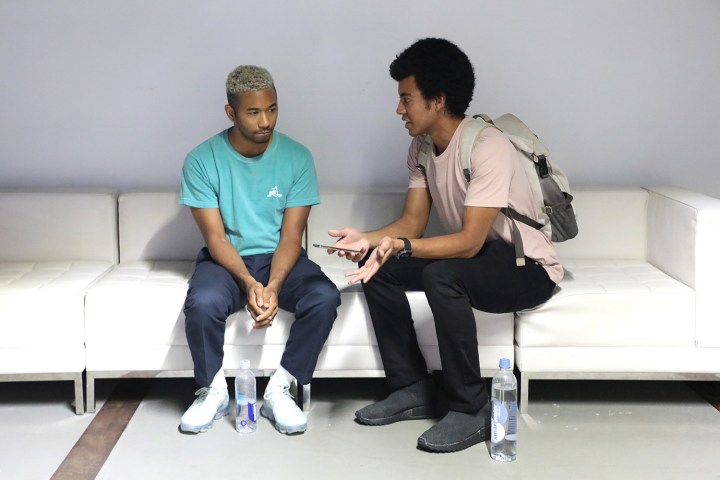
Most of us have wanted to create music at some point or another in our lives. Endel CEO, Oleg Stavitsky, thought the same thing, but with a twist.
What if your heart rate, the weather, and even the type of day you’ve had could generate completely unique music for you, with the expressed intent of remedying that which ails you? Had a stressful day at work and need to relax? Tell Alexa you’re home, then sit back as your Apple Watch begins measuring your heart rate, your schedule is surveyed, and the lights and thermostat are adjusted accordingly. All you have to do is relax and zone out as a unique soundscape fills the space around you, adjusting in real-time to what your body is doing.
This is the future Endel sees for us, and companies like Apple and Smartwater, as well as musicians Toro y Moi and Washed Out are seeing it too.
What is Endel?
Endel is a technology that generates a soundscape that tries to help you focus, relax, and sleep. Stavitsky told Digital Trends it takes in the time of day, the weather, your heart rate, and more, to create soundscapes that adapt and change accordingly.
We've reworked the sound again. Even the most hardcore fans might have found a couple of surprises after the recent update.
Relax soundscape has changed the most. Have you noticed? pic.twitter.com/ivAYF1vu64
— Endel (@EndelSound) September 20, 2019
“It has a purpose,” Chaz Bear of Toro y Moi told Digital Trends. “It’s a tool. It’s like furniture; it has a function. It’s to make you think more, and it helps you tune out so you can get what you need to get done.” Bear is collaborating with Endel’s artificially intelligent algorithm.
There’s a growing body of playlists on Spotify, Apple Music, YouTube and other streaming services which emphasize focusing, relaxing, or helping the listener sleep. At the same time, a burgeoning smart home and wearable market aims to make your life easier and less stressful in similar ways. Although Stavitsky is passionate about the expressed goals here, he finds the mechanisms by which they function inherently flawed.
“The tech industry has been trying to find new ways to listen to music for a while now and I think all of them kind of fall flat because, essentially, it all comes down to different playlists,” Stavitsky said. “What we have here [with Endel] is music that is procedurally generated and adaptive and generated by an algorithm in real-time.”

The algorithm, and its measured results, are based on the psychological theory “Flow,” named by psychologist Mihaly Csikszentmihalyi, who explored and theorized this concept extensively in his seminal work, Flow: The Psychology of Optimal Experience. Rooted in the idea of being “in the zone,” Flow is based on a concept thousands of years old that spans almost every culture and population.
When you’re in the zone, or out of it, you know. And so does Endel, thanks to direct collaboration with Csikszentmihalyi himself.
“We cold emailed him [and said], ‘we’re building a technology that puts people in a state of flow, can we please show you [it]? Can you help us design this methodology?’ And he says, ‘sure, just use mine.’” Stavitsky said. “He gave me a notebook from the ’80s with a survey that he designed for his book Flow when he was writing that back in the ’80s and shows us the method he established to measure if you are in a state of flow, called the experience sampling method. So, we took photos of all the notebooks, and turned it into a survey and built that into our closed beta.”
With an established methodology put into place and extensive testing, Endel’s algorithm uses these principles to create music that puts you in a Flow, and those in the music, technology, and wellness industries have taken note.
Record deals with Warner Music
You may know Endel from being the first algorithm to sign a major record deal. You read that right. In the spring of 2019, Endel signed with Warner Music to produce music under its banner — 600 songs to be precise — but Stavitsky wouldn’t call what Endel makes “music.”
“We don’t even think of our output as music, we don’t call it music, we call them functional soundscapes,” he said. “To pre-record this kind of defies the point of what we’re doing here because the whole point is real-time adapting, and [Warner Music] were like, ‘yeah, yeah, that’s nice, can you do it?’ So we made 20 albums, literally with the click of a button.”

At the time, headlines swirled about the end of the music industry coming by way of A.I., yet another industry set to fall to the bots. I don’t think it’s all so doom and gloom, personally, but I was curious how an established artist like Chaz Bear of Toro y Moi felt about A.I. creating the very art he himself produces.
“When I first heard this idea, I was like ‘yes, this is a genius idea.’” Bear said.
An accomplished genre-bending artist in his own right, Bear personally values mental wellness and is well-acquainted with what the right sounds can elicit, regardless of who or rather what generates it.
“A high-pitched sound can make you shriek and a low-pitched sound can make you feel uncomfortable and crowded,” Bear said. “It’s very obvious which tones work so it’s just [a matter of] finding the right notes.”
The soundscapes Endel produces often incorporate repetition, which brings the mind to ease, but the pattern changes slightly as your inputs feed more data. For instance, your slowing heart rate may change the tones in a relaxation soundscape to maintain the proper physiological and mental response.
The idea of repetition and sound looping makes time go away. That’s the key, it has to repeat but in its own unique way.
“There’s something about repetition, like being in a grocery store and seeing a shelf full of Campbell’s soup cans or something,” Bear said. “That pattern repeating gives you pleasure. The same thing with sound and sonics. House music is like ‘oh shit this is my jam’ — it’s just a loop — or it can also be like a looping siren sound. The idea of repetition and sound looping makes time go away. That’s the key, it has to repeat but in its own unique way.”
It sounds eerily similar to how Endel adjusts to the feedback it receives. But Bear isn’t creeped out or threatened by the prospect of A.I. making music. In fact, he recently collaborated with Endel on a project brokered by Smartwater to create music with Endel’s algorithm. As head creative, he and artists Nosaj Thing, Empress Of, and Washed Out, went into a studio with the algorithm’s sound engineer and a guideline on what to do (and not do) to make tracks that can help listeners achieve Flow. The four-track collaboration can be found on most music streaming services, but neither Bear nor Endel see this as a limited engagement.
“It’s still new, you know, it’s not even fully finished yet,” Bear said. “This is just the beginning. Really, it’s going to be an interesting platform to bring artists into the realm of wellness and then bring wellness to the public.”
A truly smart ecosystem at home, and on the go
As adept as Endel might be with tailoring sounds for you, the company has its sights on influencing as many aspects of your life as possible, from your transit in planes or cars to the whole-home experience. All of which are aimed at evoking the same positive changes as the Endel soundscape app.
Stavitsky said there’s a lot of research into how certain frequency scales and tones influence a person’s cognitive state, and how light and temperature can be influences as well. The current crop of smart home devices don’t really use the data surrounding them to influence your life.
“They’re connected devices and all you can do is control your light with this smartphone — big deal,” Stavitsky said. “The issue here is people do not use the data that all of these devices have about you — we do, we will understand that heart rate is raised, you just spent an hour in traffic, you had 10 meetings — when you have all that, we’ll engineer the environment around you based on information that we know about your day. Like hey, you just had a very rough day. You had 10 meetings you’ve been stuck in traffic. Why don’t we dim the lights? Why don’t we change the temperature? Why don’t we create a soundscape for you?”

The company is in talks with automobile manufacturers, airlines, and more, recently announcing a partnership with streaming service Twitch to launch an Endel channel for sleep. Apple has also been supporting and featuring Endel releases on all Apple platforms, including tvOS and WatchOS, specifically using Endel’s designs and screenshots in some of their marketing campaigns for the Apple Watch.
“Going beyond sound was integrated into our vision from day one,” Stavitsky said. “Sound is just the very first step. You’ll see what’s coming; there’s a lot.”



